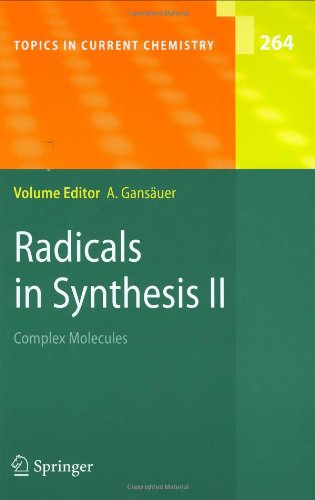

Most ebook files are in PDF format, so you can easily read them using various software such as Foxit Reader or directly on the Google Chrome browser.
Some ebook files are released by publishers in other formats such as .awz, .mobi, .epub, .fb2, etc. You may need to install specific software to read these formats on mobile/PC, such as Calibre.
Please read the tutorial at this link: https://ebookbell.com/faq
We offer FREE conversion to the popular formats you request; however, this may take some time. Therefore, right after payment, please email us, and we will try to provide the service as quickly as possible.
For some exceptional file formats or broken links (if any), please refrain from opening any disputes. Instead, email us first, and we will try to assist within a maximum of 6 hours.
EbookBell Team

4.3
48 reviewsFrom the reviews:
"The use of organic free radicals in organic synthesis has matured to become a diverse and sophisticated endeavor. this volume of Topics in Current Chemistry is the successor to Radicals in Synthesis I and addresses the application of radical methodologies toward the efficient assembly of complex molecules. Many of these processes highlight the exquistie chemoselective, regioselective, and diastereoselective reactions achievable by employing free-radical intermediates, often under conditions that are experimentally mild and environmentally benign."
"Thus this book is a very valuable resource for those wishing to update their knowledge with a compendium of work by leading practitioners in the field."
"In summary, this diverse collection of topics gives a sampling of the very sophisticated and powerful methodologies utilized in the construction of complex organic small molecules using radical intermediates. Consistently, the focus is on the newest advances in the field, highlighting very recent works while providing references to valuable reviews of previous work. In a few of the early chapters, the specifics are hard to follow in instances where details are discussed but no structures are provided. However this failing only occurs in a few cases; most of the work is clearly illustrated. This Collection of thoughtfully written chapters serves to highlight the impressive efficiency and selectivity of free-radical chemistry as a powerful and rapidly developing field."
from: R. Braslau, University of California, J.Am.Chem.Vol.128, No.40, 2006
"The second volume (Complex Molecules) focuses on the use of radicals in synthetic applications. … The chapters, written by leading experts, provide state-of-the-art reviews of exciting and pertinent topics of current research in radical chemistry. … is a masterly attempt at setting radicals in synthesis in context. Any researcher involved in the field should have ready access to it. … deserve to be widely read and debated." (Current Engineering Practice, 2007)